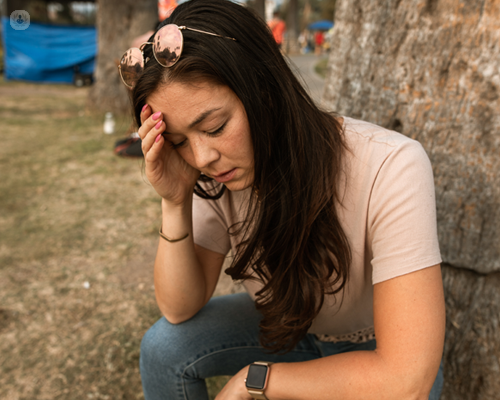All about mixed anxiety and depressive disorder
Autore:Mixed anxiety and depressive disorder, when individuals experience symptoms of both anxiety and depression, can be a challenging diagnosis. This is because these symptoms can impact daily life in differing ways. It’s the most common mental health condition in the UK, affecting 7.8 per cent of the population.
In this article, leading consultant psychiatrist Dr Iqbal Mohiuddin answers some frequently-asked questions about this condition.

What's the impact of mixed anxiety and depressive disorder in the UK?
Mixed anxiety and depressive disorder often goes undiagnosed and untreated. Individuals with mixed anxiety and depressive disorder may experience symptoms such as:
- persistent worrying;
- irritability;
- fatigue and;
- sadness.
These symptoms can have a significant impact on one's ability to function in everyday life, affecting relationships, work performance and overall well-being.
What are the symptoms of mixed anxiety and depressive disorder?
- Persistent feelings of worry and apprehension.
- Difficulty concentrating and making decisions.
- Changes in appetite and sleep patterns.
- Fatigue and low energy levels.
- Feelings of hopelessness and worthlessness.
How is mixed anxiety and depressive disorder diagnosed?
Diagnosing mixed anxiety and depressive disorder can be a challenge. This is due to overlapping symptoms of anxiety and depression. Specialists such as psychiatrists will conduct a thorough assessment, including a physical exam, mental health evaluation and discussion of symptoms and their duration. It’s very important to communicate openly and honestly with your healthcare provider so you receive an accurate diagnosis and appropriate treatment.
What are the treatment options for mixed anxiety and depressive disorder?
A combination of therapy and medication forms treatment for mixed anxiety and depressive disorder. Cognitive-behavioural therapy (CBT) is a common approach. This is because it helps individuals to identify and change any negative thought patterns and behaviours they experience. Human Givens Therapy is another effective approach to recovery. Antidepressant medications may also be prescribed in order to help manage symptoms and improve overall well-being.
What are some self-care strategies for managing mixed anxiety and depressive disorder?
In addition to professional treatment, there are several self-care strategies which can assist in the management of mixed anxiety and depressive disorder. This includes maintaining a healthy lifestyle by doing regular exercise, having a balanced diet and ensuring you have sufficient sleep. Practicing relaxation techniques such as mindfulness or deep breathing exercises can also help to reduce stress and improve mood.
Mixed anxiety and depressive disorder can have a significant impact on individuals. It’s essential to seek help from a mental health professional such as a psychiatrist, if you are experiencing symptoms of mixed anxiety and depressive disorder. Remember you aren’t alone, and there are effective treatments available to help you manage your condition and improve your quality of life.
Looking for expert treatment for mixed anxiety and depressive disorder? Arrange a consultation with Dr Mohiuddin via his Top Doctors profile.


